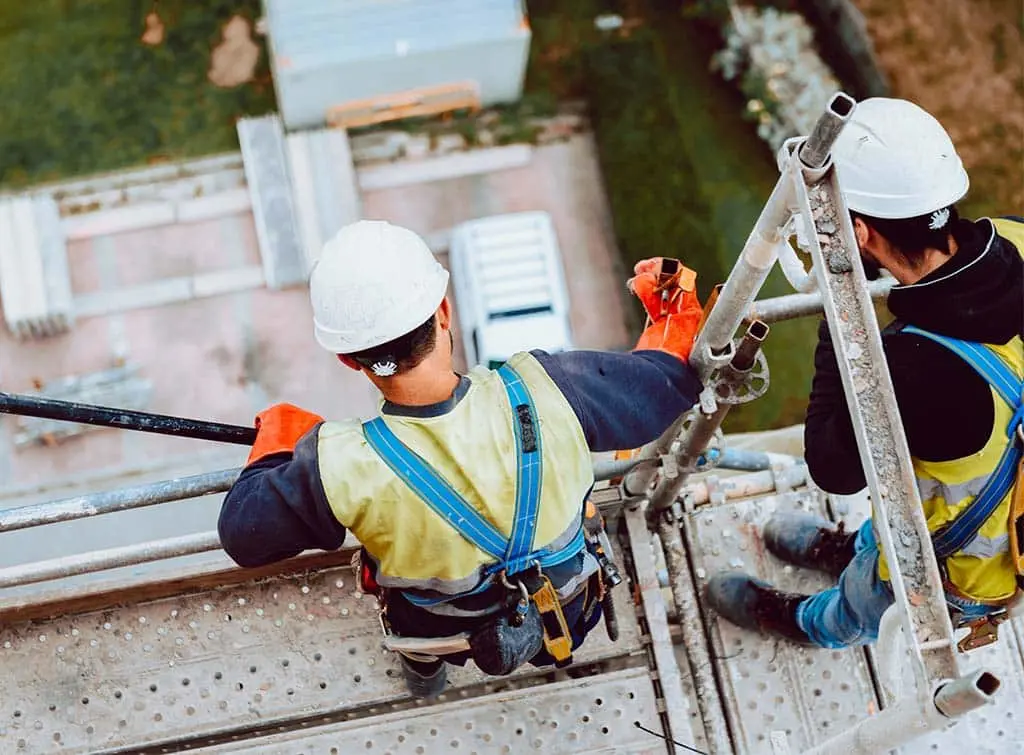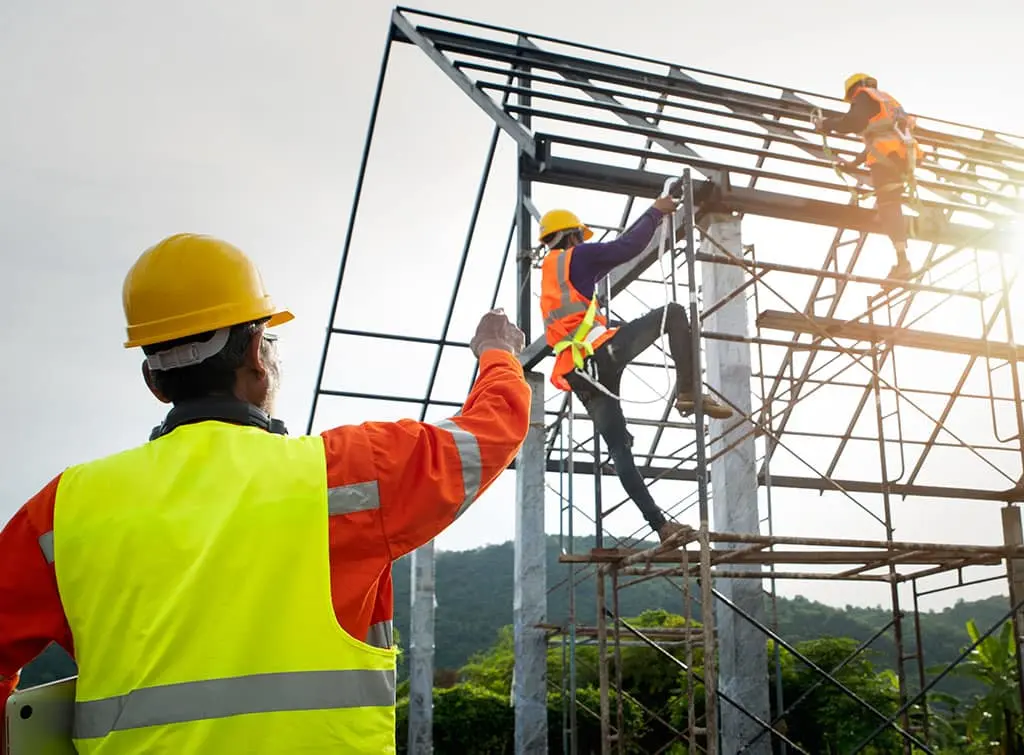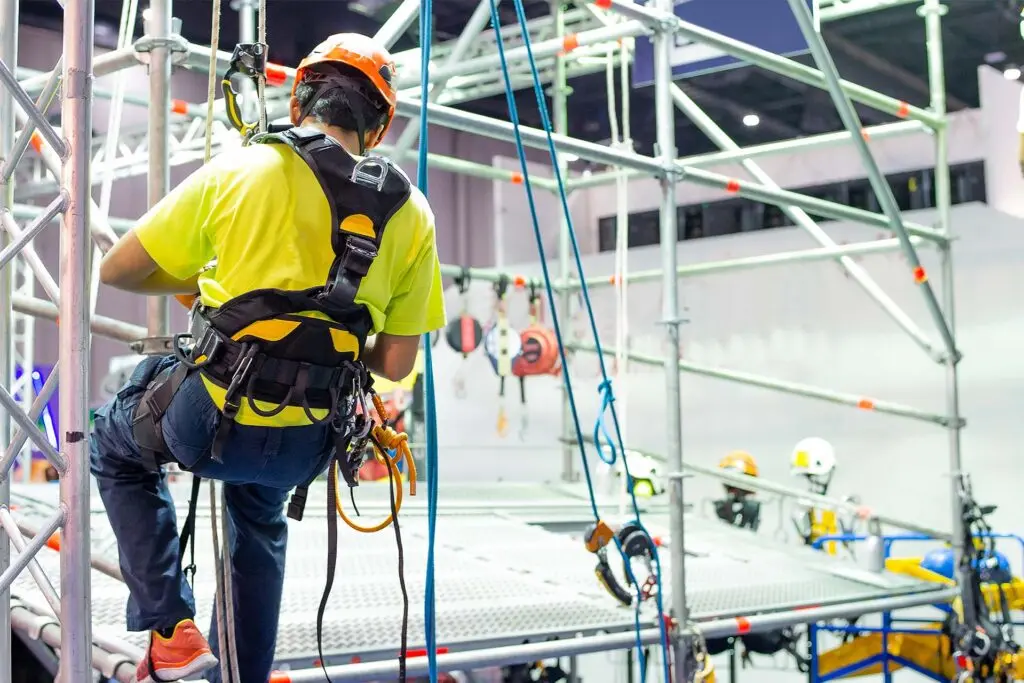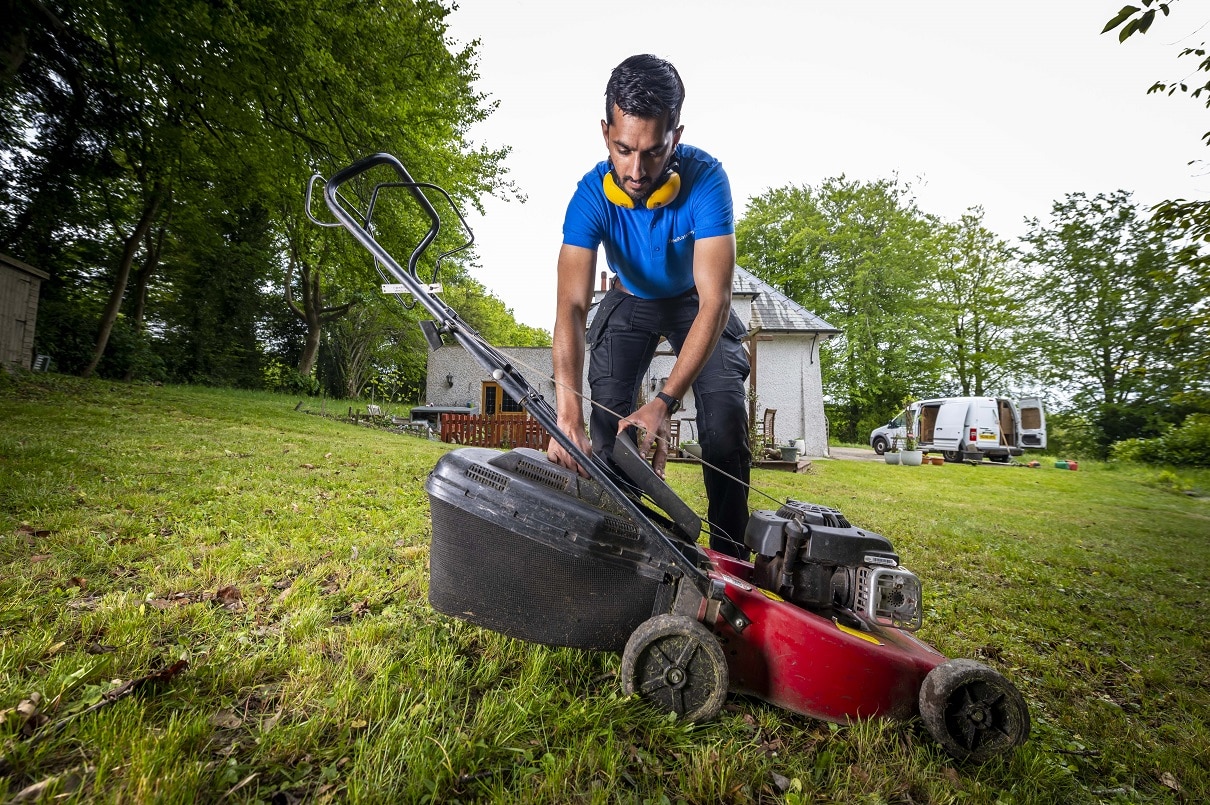Blog>Trade>Starting a Business>How to become a scaffolder
Last updated: 3 January 2025
How to become a scaffolder
Scaffolding is a useful skill which many people in construction will need. We’ve created this guide for anyone who wants to become a scaffolder. We cover specific skills and qualifications you’ll need and tips about the industry.

First things first, let’s answer the question of exactly what is a scaffolder? And what do they do?
Scaffolders are a vital component in the construction industry, as most construction crews rely on access via scaffolds.
A typical job description for scaffolders might include:
Safely unloading scaffolding from a vehicle
Putting up scaffolding poles and safely attaching them to buildings
Ensuring safety nets and guard rails are secure
Laying down and securing planks for workers to walk on
Coordinating with contractors and construction crews
Dismantling scaffolding when a job is complete
That means that a scaffolder is responsible for constructing and dismantling temporary structures on a building site. This process is vital, as it enables other workers to complete their jobs safely and efficiently.

Why should you become a scaffolder?
There are many benefits to train to be a scaffolder. These include:
Job security
Career progression opportunities
The broad variety of jobs you’ll be exposed to
The demand for new buildings is high, meaning scaffolders are currently in demand. If you’re after job security and peace of mind, scaffolding might be a great career choice for you.
The opportunity for career progression is one of the main reasons why becoming a scaffolder is a popular profession. Once you’ve got some expertise, you could progress to:
A safety inspector
A construction manager
A project manager
A business owner
If you’re hoping to eventually become self-employed, it’s easy to do so as an experienced scaffolder.
Equally, because each job will be different, every day will be unique. You’ll also quickly develop skills in multiple areas.
Grow your business with Checkatrade
We're here to send scaffolding jobs your way

What skills, qualifications, and training do I need?
Perhaps you’re wondering about specific scaffolding qualifications. As a scaffolder, you'll need a combination of:
Training
Practical experience
Education
First, you’ll need to complete a basic scaffolding qualification. After six months of on-the-job experience, you’ll be able to complete more advanced qualifications. These include:
S/NVQ level 2 qualification
S/NVQ level 3 qualification
Once all that is complete, you’ll do an additional six months of field experience, before taking your CISRS test. Then, you’ll receive your advanced scaffolder card.
When it comes to building site safety, scaffolder training is paramount. So, it’s important to secure the necessary qualifications before you begin trading.
What specific skills do I need?
Below are some of the desired skills a scaffolder needs to obtain:
You’ll want to make sure you’re prepared and physically capable of carrying heavy objects and working in all weather conditions
You need to bear in mind that scaffolding is a physically demanding profession
Great hand-eye coordination is required to complete jobs accurately and efficiently
A good comprehension of technical drawings and sketches is needed
A willingness to work at heights is required
Working at heights is an essential aspect of a scaffolder's job. You’ll need to be able to confidently perform your duties high in the air.
Grow your business with Checkatrade
We're here to send scaffolding jobs your way
How to get experience as a scaffolder
Becoming a fully qualified scaffolder can take a few years.
After your education and training, it’s a good idea to acquire experience with a scaffolding business to consolidate your skills.
You might shadow an experienced scaffolder, and immerse yourself in further on-the-job training.
Why not see if there are any scaffolding companies local to you who are seeking workers or apprentices?

Top tips for becoming a scaffolder
Launching a business isn’t easy, so we’ve come up with some top tips to help you get started.
Get the necessary practical experience: For example, by shadowing an experienced scaffolder
Invest time into learning: Education is paramount, as you’ll need to understand the on-site processes and procedures
Develop safety awareness: Safety is vital - you need to be clued up on the necessary safety protocols and practices
Invest in the correct equipment: You’ll need to make sure you have access to the correct equipment and workwear
Becoming a scaffolder requires dedicated training and on-the-job learning. By following these steps, you’ll be well on your way to a scaffolder career and securing yourself a rewarding future.
Scaffolding health and safety regulations
What are scaffolding health and safety regulations? The regulations for scaffolding are the guidelines that govern how to properly use scaffolding. They're there to make sure that your business operates under safe working practices when carrying out work at heights. Therefore, an excellent working
Checkatrade is here to help you
If you’re only just starting out on your scaffolder journey, we’re here to help you.For example, in 2024 there were over 60,000 searches on our website from people looking for skills just like yours.*
You want more work, and we're help be the foundation of that, putting homeowners in touch with quality trades. Still feel like missing out?
As a Checkatrade member, you’ll also get:
Exclusive savings on tools and workwear
Your own member profile and reviews platform
Increased visibility for your business
Reduced cost of public liability insurance with Superscript
Exclusive use of our dedicated quoting and invoicing tool
Added trust given by the Checkatrade tick and logo
Why not get in touch to learn more about the signup process, and start to grow your scaffolding business with Checkatrade?
Get more for your money with Checkatrade
Get exclusive benefits and discounts

Scaffolder FAQ’S
How long does it take to train as a scaffolder?
If you go down the scaffolding apprenticeship route, this will usually take eighteen months to complete. This will involve on-the-job training and spending time learning in a college environment.
As mentioned, there will be extra time required for more advanced scaffolder training.
How much can I earn?
The starting salary for a scaffolder in the UK is around £19,000. This can increase up to £40,000 for someone with experience. The national average salary for a scaffolder is £34,710 a year. We’ve got more tips on how much scaffolders make, as well as everything you need to know about scaffolder insurance.
Is it difficult to become a scaffolder?
Like any rewarding career**,** it can take focus, training, and dedication to develop skills as a scaffolder. Hard work will be required, but you’ll reap the benefits of a rewarding career and job security. Equally, there’s countless opportunities for career progression in the scaffolding industry.
Get more for your money with Checkatrade
Get exclusive benefits and discounts
* Internal search data from users of the Checkatrade.com website between 1st January and 31st December 2024



